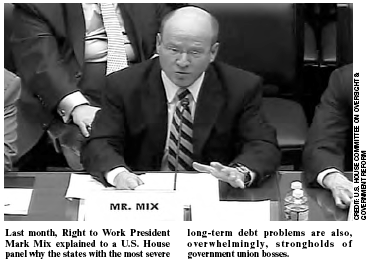Union Czar's Famous Boast Illuminates Today's State Fiscal Crises
'In a Sense,' We 'Elect Our Own Boss'
(Source: May 2011 NRTWC Newsletter)
An October 27, 1975 New York magazine feature article by journalist Ken Auletta examined the causes of the Big Apple's financial implosion that year. Three-and-a-half decades later, the article is still remembered for a remarkable quote from government union bigwig Victor Gotbaum.
The then-head of the extraordinarily powerful, Manhattan-based District Council 37 of the American Federation of State, County and Municipal Employees (AFSCME) union had "recently remarked," the story reported: "We have the ability, in a sense, to elect our own boss."
Mr. Gotbaum was alluding to the fact that, in jurisdictions like New York, where union monopoly bargaining over the pay, benefits, and working conditions of public servants is authorized by law, union bosses negotiate with government officials over such issues. At the same time, government union chiefs funnel a huge portion of the (often compulsory) dues and fees they collect from unionized workers into efforts to influence the outcomes of local and state elections.
And the outcomes of those elections often determine who represents the public at the bargaining table.
"In city after city and state after state, union bosses wield their privilege to force public employees to pay union dues, or be fired, to amass huge war chests, with which they support and oppose candidates for public office," explained National Right to Work Committee President Mark Mix.
"Big Labor thus determines who sits on one side of the bargaining table, and heavily influences who sits on the other. It is a terrible conflict of interest, which Victor Gotbaum plainly recognized, even as he bragged about it.





